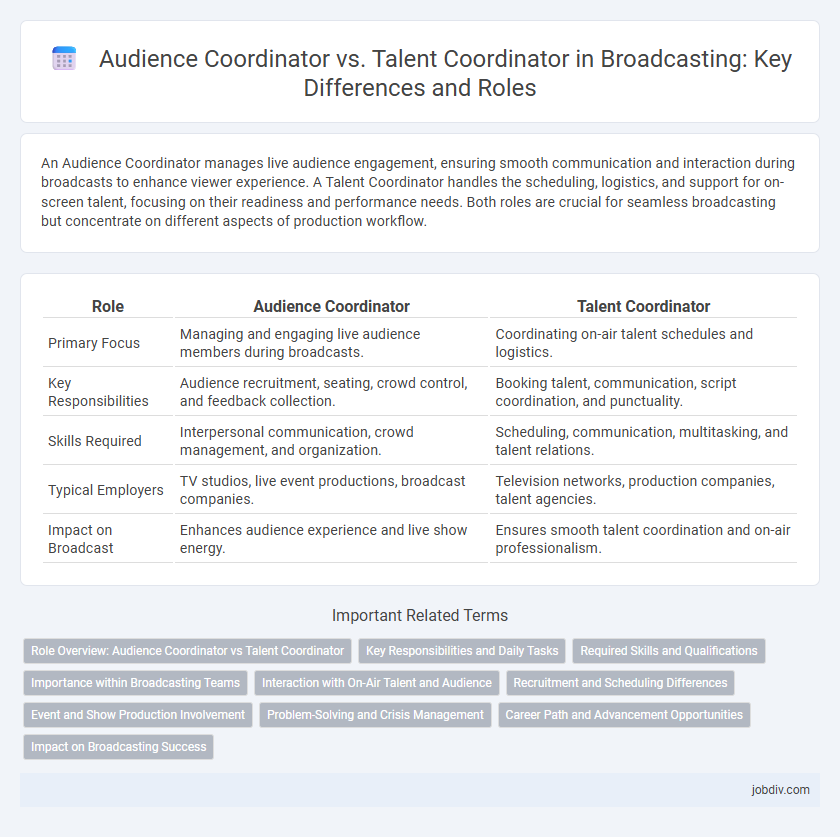An Audience Coordinator manages live audience engagement, ensuring smooth communication and interaction during broadcasts to enhance viewer experience. A Talent Coordinator handles the scheduling, logistics, and support for on-screen talent, focusing on their readiness and performance needs. Both roles are crucial for seamless broadcasting but concentrate on different aspects of production workflow.
Table of Comparison
| Role | Audience Coordinator | Talent Coordinator |
|---|---|---|
| Primary Focus | Managing and engaging live audience members during broadcasts. | Coordinating on-air talent schedules and logistics. |
| Key Responsibilities | Audience recruitment, seating, crowd control, and feedback collection. | Booking talent, communication, script coordination, and punctuality. |
| Skills Required | Interpersonal communication, crowd management, and organization. | Scheduling, communication, multitasking, and talent relations. |
| Typical Employers | TV studios, live event productions, broadcast companies. | Television networks, production companies, talent agencies. |
| Impact on Broadcast | Enhances audience experience and live show energy. | Ensures smooth talent coordination and on-air professionalism. |
Role Overview: Audience Coordinator vs Talent Coordinator
An Audience Coordinator manages viewer engagement by organizing audience participation, handling ticket distribution, and ensuring audience safety during live broadcasts. A Talent Coordinator focuses on scheduling, communicating with on-air personalities, and managing talent logistics to facilitate smooth production workflows. Both roles are critical in broadcasting but differ in their primary focus on audience interaction versus talent management.
Key Responsibilities and Daily Tasks
Audience Coordinators manage live event attendees, coordinating ticket distribution, crowd control, and audience engagement to ensure smooth show recordings. Talent Coordinators handle scheduling, communication, and logistical support for on-air personalities and performers, ensuring their readiness and comfort during broadcasts. Both roles require strong organizational skills but focus respectively on audience management and talent facilitation within the broadcasting environment.
Required Skills and Qualifications
Audience Coordinators require strong communication skills, experience in crowd management, and the ability to engage and direct live audiences effectively. Talent Coordinators must possess expertise in talent relations, scheduling, contract negotiation, and a deep understanding of the entertainment industry's dynamics. Both roles demand organizational skills and the ability to multitask under pressure, but Talent Coordinators typically need a background in talent management or entertainment business, whereas Audience Coordinators benefit from experience in event planning or public relations.
Importance within Broadcasting Teams
Audience Coordinators ensure live broadcast environments run smoothly by managing audience engagement, crowd control, and feedback, directly influencing the show's energy and viewer experience. Talent Coordinators handle scheduling, communication, and logistical support for on-air personalities, ensuring seamless talent availability and preparation. Both roles are essential for maintaining production quality and operational efficiency in broadcasting teams.
Interaction with On-Air Talent and Audience
Audience Coordinators manage live audience engagement by preparing and guiding participants during broadcasts to ensure authentic reactions and smooth interaction with on-air talent. Talent Coordinators focus on scheduling, briefing, and supporting on-air talent directly, facilitating clear communication and performance flow throughout the production. Both roles require strong interpersonal skills but differ in their interaction scope, with Audience Coordinators centered on the audience's experience and Talent Coordinators prioritizing on-air personalities.
Recruitment and Scheduling Differences
Audience Coordinators specialize in recruiting live studio audiences, organizing ticket distributions, and managing audience check-ins to ensure optimal crowd engagement during broadcasts. Talent Coordinators focus on recruiting on-air talent, such as hosts and guest speakers, scheduling rehearsals, and coordinating availability to maintain seamless production flow. These distinct roles emphasize audience management versus talent logistics to support different facets of broadcast operations.
Event and Show Production Involvement
An Audience Coordinator manages live event attendees, ensuring smooth audience flow, engagement, and safety during show production, often handling ticketing and seating arrangements. A Talent Coordinator focuses on managing artists, performers, and speakers, organizing their schedules, rehearsals, and on-site needs throughout event production. Their collaboration is crucial in live broadcasting to synchronize audience dynamics with talent activities for seamless event execution.
Problem-Solving and Crisis Management
Audience Coordinators specialize in managing live audience dynamics, swiftly addressing unexpected reactions or disruptions to maintain show flow and viewer engagement. Talent Coordinators focus on resolving scheduling conflicts, performance issues, and interpersonal challenges among on-air personalities to ensure seamless production. Both roles require adept crisis management skills, but Audience Coordinators emphasize real-time problem-solving with viewers, while Talent Coordinators handle behind-the-scenes personnel coordination.
Career Path and Advancement Opportunities
An Audience Coordinator in broadcasting manages live studio audiences, ensuring smooth engagement and feedback, which builds skills in crowd management and event planning. A Talent Coordinator focuses on recruiting, scheduling, and supporting on-air personalities, offering deeper exposure to talent relations and production logistics. Career advancement for Audience Coordinators often leads to roles in production management or event direction, while Talent Coordinators typically progress toward casting director or talent management positions.
Impact on Broadcasting Success
Audience Coordinators enhance broadcasting success by managing viewer engagement, conducting audience research, and ensuring content appeals to target demographics, which drives ratings and advertiser interest. Talent Coordinators secure on-air personalities and manage their schedules, fostering seamless production and maintaining consistent show quality that captivates audiences. Both roles are integral, with Audience Coordinators boosting viewer retention and Talent Coordinators ensuring professional delivery, collectively elevating broadcast performance.
Audience Coordinator vs Talent Coordinator Infographic

 jobdiv.com
jobdiv.com